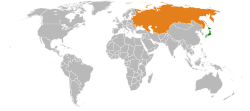Japan–Soviet Union relations
 |
|
|
Japan |
Soviet Union |
|---|---|
Relations between the Soviet Union and Japan between the Communist takeover in 1917 and the collapse of Communism in 1991 tended to be hostile. Japan had sent troops to counter the Bolshevik presence in Russia's Far East during the Russian Civil War, and both countries had been in opposite camps during World War II and the Cold War. In addition, territorial conflicts over the Kuril Islands and South Sakhalin were a constant source of tension. These, with a number of smaller conflicts, prevented both countries from signing a peace treaty after World War II, and even today matters remain unresolved.
Strains in Japan–Soviet Union relations have deep historical roots, going back to the competition of the Japanese and Russian empires for dominance in Northeast Asia. The Soviet government refused to sign the 1951 peace treaty and the state of war between the Soviet Union and Japan technically existed until 1956, when it was ended by the Soviet–Japanese Joint Declaration of 1956. A formal peace treaty between the Soviet Union (subsequently Russia) and Japan still has not been signed.
The main stumbling block to improving relations between the Soviet Union and Japan in the post-war period has been the territorial dispute over the Kurils, which are known as the Northern Territories in Japan.
The poor relations between the Soviet Union and Japan from the 1920s until the late 1940s originated in Japan's victory over imperial Russia, the predecessor state of the Soviet Union, in the Russo-Japanese War of 1904-05. During the Russian Civil War (1918–21), Japan (as a member of the Allied interventionist forces) occupied Vladivostok from 1918 until 1922, using as many as 70,000 troops.
...
Wikipedia
